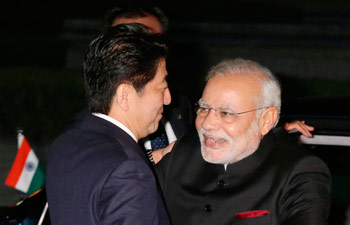Tokyo, Sep 1: Japan today announced doubling of its private and public investment in India to about USD 34 billion over the next five years even as the two countries decided to elevate their ties to a Special Strategic Global Partnership but failed to conclude a civil nuclear deal.
Prime Minister Narendra Modi and his Japanese counterpart Shinzo Abe during their summit talks also reaffirmed the importance of bilateral defence relations in their strategic partnership and agreed on greater defence equipment and technology cooperation.
The summit meeting took place on the third day of Modi's five-day visit to Japan when the two countries also decided to expedite talks on sale of US-2 amphibian aircraft to India for enhancing maritime security.
At a joint press conference, Abe also announced that as an example of Indo-Japan cooperation, Tokyo will help India in providing financial, technical and operational support to introduce Bullet trains, a project that Modi has been actively pursuing.
Japan will also help India in providing better connectivity with its neighbours, he said.
On the civil nuclear deal, which was expected to be finalised during the visit, Abe said they have directed the officials to accelerate negotiations for early conclusion of an agreement to strengthen partnership.
While India is said to be pursuing the deal with Japan on the template of the landmark Indo-US nuclear accord, Tokyo is said to be not that enthusiastic about that being the basis.
The 3.5 trillion yen( 34 billion USD) of investment from Japan to India including Official Development Assositance(ODA) during a 5-year period will be under the aegis of India–Japan Investment Promotion Partnership for development of projects including infrastructure and building of smart cities.
The five-year period will also see the doubling of the presence of Japanese firms in India, Abe said.
Thanking Abe for providing him an opportunity to make Japan his first bilateral visit outside South Asia, Modi said," we both have decided to raise the relationship to a special strategic and global partnership by giving it a special emphasis".
Asserting that his visit ushered in a dawn of new era in Indo-Japan relations, Modi said there is no "limit" to partnership between the two countries.






Comments
Add new comment